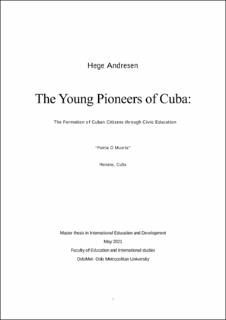| dc.description.abstract | After the revolution in Cuba, it was a clear goal and commitment that only through education could Cuba recover from the massive social differences, poverty and underdevelopment. The Castro regime created a social contract with its people, and the regime promised to provide education, healthcare and racial, economic and political equality.Education was made a resource priority. In this context, the two codes of education and moralism were basic to the revolution’s self-image and the experience of reform and empowerment. The year of education (1961) can show for a massive literacy campaign with the outcome which made Cuba ‘’free from illiteracy’’. With the massively investment that went into educational expansion, and the belief in education as a key to Cuba’s future was ingrained in the process along with keeping the values of the revolution and making students good pioneers for Cuba. The literacy levels underline the fact that Cuba’s education system is incredible successful. On the other hand, not much attention has been paid to the philosophical structure underpinning this system. The Cuban revolution, building on the educational values of José Martí, has been and still is a big part of the educational presence in Cuba’s citizenship education. Social norms and citizenship education in Cuba is taught through civic education. The main findings in this study, shows that Civics education is highly ideological. The dynamic process of the Cuban ideology is deeply present in the citizens’ social obligations towards the state, taught through civic education. The Cuban education system is a form of inclusive nationalism with a clear definition of what it means to be a member of the collective society. The Cuban regime has used the educational system to socialize Cubans to equate social independence with subversion and counterrevolution. This makes the ideological development of Cuba important in civic education. | en_US |
